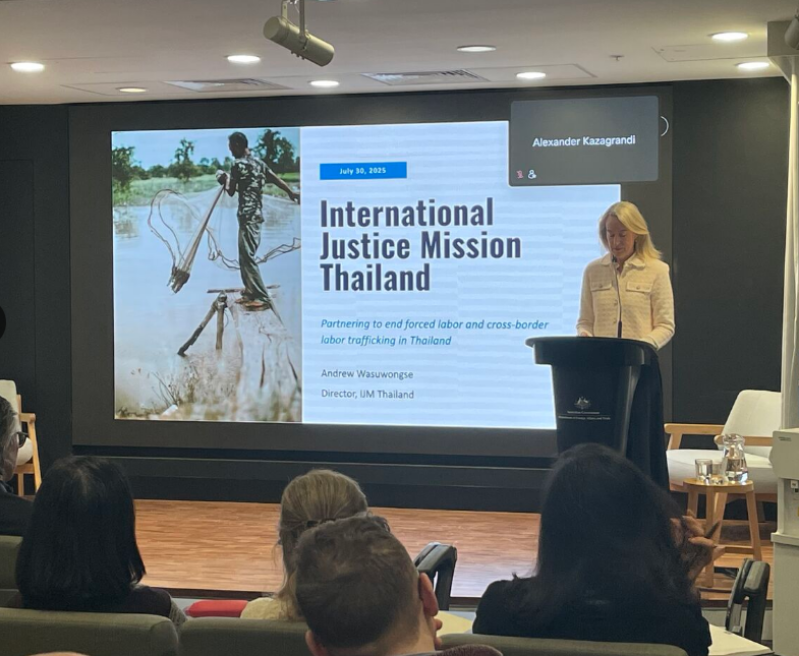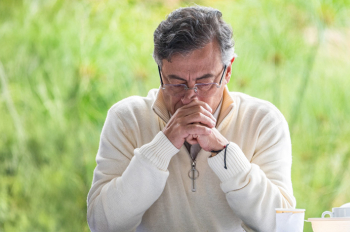
On the United Nations World Day Against Trafficking in Persons (July 30), International Justice Mission (IJM) called on the Australian government to demonstrate stronger political leadership in addressing modern slavery and transnational human trafficking, which continue to escalate across Southeast Asia and within Australian borders.
IJM, a Christian anti-trafficking and anti-violence non-governmental organization, published a statement on social media underscoring the need for action and collaboration. The post coincided with a high-level meeting between Australian government representatives and IJM Thailand Country Director Andrew Wasuwongse focusing on the growing threat of trafficking into cyberscamming operations in Southeast Asia.
The event featured input from the Australian Federal Police’s Joint Policing Cybercrime Coordination Centre (JPC3) and Jane Duke, Assistant Secretary of the Counter Modern Slavery, People Smuggling and Transnational Crime Branch at the Department of Foreign Affairs and Trade (DFAT).
“IJM provided recommendations for Australia to step up our efforts to curb this transnational criminal industry, including investing in frontline agencies and NGOs to better identify victims of trafficking into forced criminality, and apply targeted sanctions on high profile individuals linked to the scam centres, in line with recent U.S. and U.K. sanctions,” the group said.
“We're grateful to DFAT and the AGD for the important role they play in countering human trafficking in our region through regional dialogue, targeted investment and domestic legislation, and look forward to future collaboration to bring protection to vulnerable people in our region.”
In a separate update, IJM Australia acknowledged progress made but emphasized “the urgent need for global leaders to address this problem.”
“At IJM, we have the privilege of journeying with survivors in their journey of restoration, one step at a time. Between the staff on the frontlines during a rescue operation, to the social workers, to the legal professionals, IJM and our partners seek for justice to be realised at every step in the process of securing freedom.”
The NGO also pledged to continue working with the Australian government to encourage politicians in leadership to “play their part” in addressing the issue of human trafficking, so that vulnerable and impoverished people can be “effectively protected from violence.”
“We believe that the government can keep making strides in building robust legislation that protects vulnerable communities, and providing significant support within the Indo-Pacific region to equip victims and survivors with the resources to thrive. We won't stop, until all are free.”
Meanwhile, the Australian Federal Police (AFP) also marked the UN day by releasing updated figures and warnings about trafficking and modern slavery. According to AFP data, there were 382 reports of modern slavery and human trafficking offenses in the 2023–24 financial year, a 12% increase from the previous year and the highest number on record.
“Of these reports—which cover human trafficking, debt bondage, forced marriage, servitude and slavery—forced marriage accounts for the largest proportion of reports, at 91 reports – or roughly one every four days,” the AFP said in its news update.
“What makes the figures even more concerning is research from the Australian Institute of Criminology estimating that for every one victim of human trafficking or slavery detected, four remain undetected.”
The statement emphasized that trafficking and exploitation are not limited to overseas—they are present across Australia in suburbs, towns, cities, and schools.
“It is a grim reality hiding in plain sight in modern Australia. And one the AFP is pulling back the curtains on," the AFP said.
AFP Commander Helen Schneider highlighted an issue with detection and identification of trafficking crimes in that potential victims may be unaware they are victims under Australian law, or feel too vulnerable or scared to speak up.
“This can especially be the case when perpetrators are members of their family or community, or where they may fear shame or embarrassment from their communities,” Schneider said.
“These factors often prevent victims from reporting human exploitation crimes to law enforcement,” she said, and noted that trafficking and exploitation offenses frequently overlap.
Schneider gave an example of someone who is a victim of forced marriage who may also be a victim of slavery or servitude. Or someone who is a victim of forced labour who may also be a victim of deceptive recruiting or debt bondage.
“The situation may not always be clear cut. And it’s also not something the people around them may recognise, simply because it’s not on the radar for the wider Australian community,” she added.
“But the fact is, human exploitation offences such as human trafficking, slavery, servitude and forced marriage do happen right here in Australia - in our communities, neighborhoods, workplaces and schools. They could be happening in your street.
“These occur across varied industries and sectors, including in private and domestic settings. But while the circumstances may change, the horrendous impacts of these crimes are wholesale—exploiting the vulnerability of victims and subjecting them to mental and physical abuse."
Schneider also highlighted that Australia was a “destination country” for human trafficking with AFP investigations uncovering victims trafficked from around the globe.
“Human trafficking and exploitation know no borders,” Schneider said. “Australia is, and must remain, part of a global response to combat people trafficking and modern slavery.
“The AFP partners with law enforcement, government and non-government agencies globally to prevent, disrupt, and investigate human trafficking and slavery, while providing vital protection and support to victims.”
To strengthen that response, the AFP has established the Human Exploitation Community Officer (HECO) program between 2023 and 2024. The initiative supports and empowers those at high risk of exploitation to report crimes and seek support.
For those in Australia who suspect they or someone they know may be at risk of modern slavery or human trafficking, the AFP urges calling 131 AFP (237) or submitting a confidential report through the AFP’s online form. In an emergency, dial Triple Zero (000).
Victim support is also available through the Support for Trafficked People Program, administered nationally by the Australian Red Cross. For confidential advice, contact the Red Cross at 1800 113 015 or visit their website.






